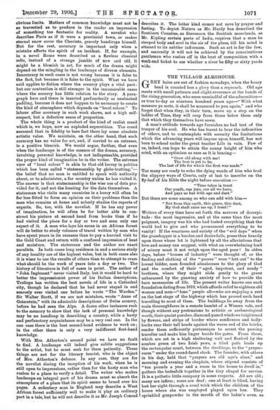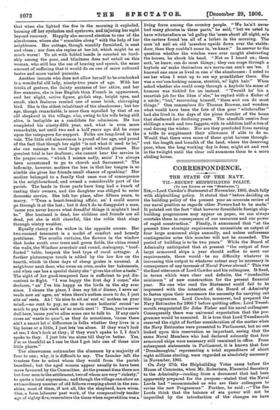THE VILLAGE ALMSHOUSE.
GREY hairs are out of fashion nowadays, when the hoary head is counted less a glory than a reproach. Old age meets with small patience and slight reverence at the hands of the rising generation, who seem unmindful of the admonition—
as true to-day as nineteen hundred years ago—" With what measure ye mete, it shall be measured to you again," and who forget that when they, in their turn, move up a step on the ladder of Time, they will reap front those below them only that which they themselves have sown.
A man's attitude towards age furnishes no bad test of the temper of his soul. He who has learnt to bear the infirmities of others, and to contemplate with serenity the limitations
which the advancing years will impose upon himself, has not been to school under the great teacher Life in vain. Few of us, indeed, can hope to attain the sunny height of him who cried, with an optimism as rare as it is bracing— "Grow old along with me! The best is yet to be,
The last of life for which the first was made."
Too many are ready to echo the dying words of him who trod the slippery ways of Courts, only at last to inscribe on the fly-leaf of his Bible the night before execution :—
" Time takes in trust
Our youth, our joys, our all we have, And pays us but with age and dust."
But there are some among us who can add with him- " But from this earth, this grave, this dust, My God shall raise me up, I trust!"
Writers of every time have set forth the sorrows of decrepi- tude: the most impressive, and at the same time the most
poignant, imagery was his who had tasted everything that the world had to give and who pronounced everything to be vanity ! If the weariness and satiety of the "evil days" when the grasshopper is a burden and desire fails, press thus heavily upon those whose lot is lightened by all the alleviations that love and money can suggest, with what an overwhelming load of misery must it not weigh upon the aged poor ! In olden days, before "houses of industry" were thought of, or the feeding and clothing of the " poores " were " lett out" to the lowest bidder, men founded almshouses to the glory of God and the comfort of their "aged, impotent, and needy " brethren, where they might slide gently to the grave unharassed by the gnawing anxiety of bow to provide the bare necessaries of life. The present writer knows one such foundation dating from 1610, which affords relief to eighteen old women and men—" lone" people all—who are enjoying a rest on the last stage of the highway which has proved such bard travelling to most of them. The buildings lie away from the main thoroughfares in a remote hamlet of a Wessex vale, and though without any pretensions to artistic or archaeological worth, thei r quaint porches, diamond-paned windows brightened by flowers, and strips of border where sunflowers and holly- hocks rear their tall heads against the warm red of the bricks, render them sufficiently picturesque to arrest the passing
traveller and make him linger beside the gates. From these, which are set in a high sheltering wall and flanked by the
sombre green of two Irish yews, a tiled path leads up the rectangular court, between the dwellings, to the " prayer- room " under the round-faced clock. The founder, with others in his day, held that "prayers are old age's alms," and morning and evening the chaplain, whose stipend consists of "ten pounds a year and a room in the house to dwell in," gathers the bedesfolk together in the tiny chapel for service. It is a pathetic little company in some respects. All are old ; many are infirm ; some are deaf ; one at least is blind, having lost her sight through a cruel trick which the children of the house where she was employed played upon her. They sprinkled gunpowder in the mouth of the baker's oven. so that when she lighted the fire in the morning it exploded, burning off her eyelashes and eyebrows, and injuring her sight beyond recovery. Happily she secured election to one of. the almshouses, where she " scambles along" with the help of her neighbours. Her cottage, though scantily furnished, is neat and clean ; nor does she repine at her lot, which might be so much worse! To sit with folded hinds is counted no hard- ship among the poor, and blindness does not entail on this woman, who still has the use of hearing and speech, the same amount of suffering that it would do on one of more cultured tastes and more varied pursuits.
Another inmate who does not allow herself to be overlooked is a wonderful old lady, ninety-two years of age. With her tricks of gesture, the dainty neatness of her attire, and her fine manners, she is less English than French in appearance, and her slight, active figure, girlish step, bright eyes, and small, alert features remind one of some brisk, chirruping bird. She is the oldest inhabitant of the almshouses; but her age, though remarkable, is more than equalled by that of an old shepherd in the village, who, owing to his wife being still alive, is ineligible as a candidate for admission. He has completed his ninety-fifth year, and, what is even more remarkable, not until two and a half years ago did lie come upon the ratepayers for support. Folks are long-lived in the vale. The little old almswoman is proud of her age, and proud of the fact that though her sight "is not what it used to be," she can manage to read large print without glasses. Her greatest trial is her deafness ; she cannot hear the service in the prayer-room, "which I misses sadly, seem' I've always been accustomed to go to church and Sacrament." The infirmity, however, matters the less in that her tongue is so nimble she gives her friends small chance of speaking ! Her mother belonged to a family that once was of consequence in the neighbourhood, and owned a considerable part of the parish. The lands in these parts have long had a knack of casting their owners, and the daughter was obliged to enter domestic service. She left her place, after fifteen years, to marry. " 'Twas a heart-breaking affair, an' I could scarce go through it at the last ; but it don't do to disappoint a man, 'cause you never knows what dreadful things it mightn't lead to." Her husband is dead, her children and friends are all dead, yet she is still cheerful, like the robin • that sings through wintry weather.
Equally cheery is the widow in the opposite corner. Her two-roomed tenement is a model of comfort and homely prettiness. The muslin curtains, the flowers in the window that looks south over trees and green fields, the china round the walls, the Windsor armchair and round, mahogany, " hoof- footed " table, bespeak the best type of rural cottager. A further picturesque touch is added by the low fire on the hearth, which in these days of cheap grates is unusual. A neighbour next door, who owns an oven, cooks her bakemeats, and when one has a special dainty she "gives the other a taste." The sight of her good-tempered face is sufficient to put dis- content to flight. "I was happy the first day I come," she =declares, "an' I've bin happy as the birds in the sky ever since. I cleans the place, I does my bit o' dinner, I sews an' reads now an' agen, an' when there's nothen more to do, I just sits an' rests. Ah ! 'Lis nice to sit an' rest wi' nothen on your mind,—no rent to pay, no one to come botherin' round so much to pay this week an' so much next ' ! Then, you're never dull here, 'cause you've allus some one to talk to. If any one's cross an' wants to gnarl, as they do sometimes, 'cause there ain't a smart lot o' difference in folks whether they lives in a big house or a little, I just lets 'em alone. If they wun't look at me, I don't look at they ; if they wun't spake to I, I don't spake to they. I just lets 'em alone till they're better. Yes, I'm as thankful as I can be that I got into one of these nice little places."
The almswomen outnumber the almsmen by a majority of four to one ; why, it is difficult to say. The founder left the trustees free to select whom they would from the parish benefited ; but the aged women appear usually to have been more favoured by the Committee. At the present time there are but four men in the settlement, two of whom are very" rickety," to quote a local expression ; and though the village can show an extraordinary number of old fellows creeping about in the sun- shine, most of them, if not all, like the shepherd, have wives. One, a farm labourer past work, of the comparatively tender age of eighty-five, remembers the times when superstition was a
living force among the country people. "We lia'n't never had many ghostes in these parts," he said, "but we usted to have witchcrafters as 'ud gallop the 'arses about all night, soss the carters found 'em all of a lather in the morning. The men 'ud nail an old 'arseshoe upside down over the stable- door, then they couldn't come in, 'ee knaw." In answer to the question whether the witches were ever caught abstracting the horses, he shook his head. "Nob as I beard on ; them sort, 'ee knaw, can do most things ; they can crape through a keyhole an' make theirselves so's narra-one can't see 'eta. I knawed one once as lived in one o' the almshouses : I listed to see her when I went up to see my grandfather there. She was a cueous-looking 00MaLl, stoutish, wi' light hair." When asked whether she could creep through a keyhole his sense of humour was tickled for an instant. "Twould ha' bin a smartish job fur the likes o' she," he replied with a flicker of a smile; "but," recovering himself, "them sort can do most things." One remembers Sir Thomas Browne, and wonders what would have been the fate of this poor" witchcrafter " had she lived in the days of the pious founder of the home that sheltered her declining years. The almsfolk receive four shillings a week and two faggots, with in addition half-a-ton of coal during the winter. Nor are they precluded from earning a trifle to supplement their allowance if able to do so. Would that there were more of these quiet havens through- out the length and breadth of the land, where the deserving poor, when the long working day is done, might sit and rest in the twilight until the clear call summons them to a more abiding house.



































 Previous page
Previous page